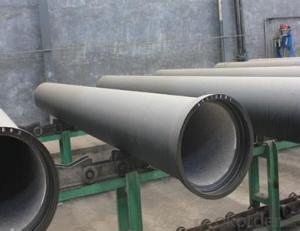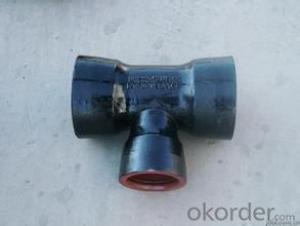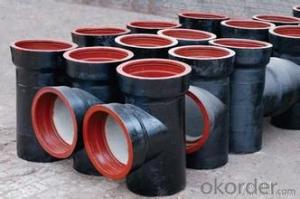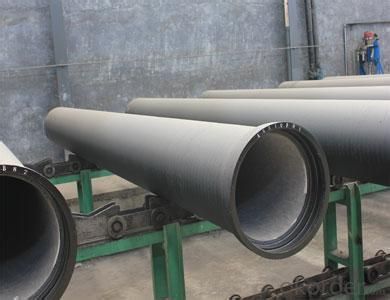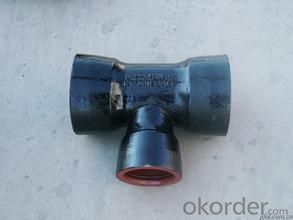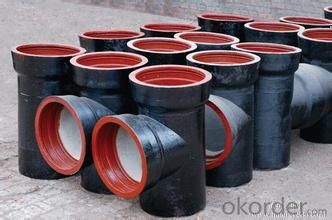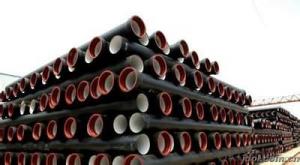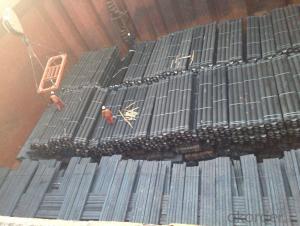DUCTILE IRON PIPE K8 DN100
- Loading Port:
- China Main Port
- Payment Terms:
- TT OR LC
- Min Order Qty:
- -
- Supply Capability:
- -
OKorder Service Pledge
OKorder Financial Service
You Might Also Like
Ductile Iron Cast Pipe is without any defects compare with tradition casting tech, which has many advantages particularly as follow:
(1) High density. In the "vertical upward casting" process, the melt iron of centre liquid column in center crystallizer is continuously feeding for volume shrinkage caused by condensation tube at outer circumference , which lead to be free of shrinkage porosity.
(2) High purity. When melt iron pouring, the mixed impurities such as gas, dross, sand grain which are lighter than melt iron could be eliminated at furnace mouth, its impossible to enter into the crystallizer through the channel, so the melt iron into the crystallizer is very pure.
(3) Strength with toughness. The cooling speed provided by continuous crystallizer is 30 times than sand casting and 5 times than centrifugal casting, and doesn't produce white iron, the eutectic cell volume of continuous cast iron is one eighth to one tenth compare with traditional cast iron. The density of graphite nodule in ductile iron can reach 300-700 pcs/mm2. Therefore, all reason above improve the strength and toughness of continuous cast iron.
(4) Free machining. The high speed cooling make the hardening phase (such as boride, steadite) not appear like reticular, massive or thick, but diffuse like fish bone and pane in shape, moreover, there are tiny graphite flakes inlaid hardening phase. It's free machining in BrinellHardness the range of 250-300HB. However, the Brinell Hardness of 250 is top limit to common metal materials.
(5) Uniform composition of tube wall. The convection mixing of liquid column caused by marching type drawing in crystallizer make the composition of tube wall well-distributed, and concentration gradient very little.
(6) High productivity. To the wall thickness of tube under 10mm, the speed of continuous casting is 1 meter/min, to the wall thickness of tube under 20mm, the speed of continuous casting is 0.5 meter/min, which is high efficiency that centrifugal or other casting tech couldn't reach.
- Q: How do ductile iron pipes handle extreme temperatures?
- Ductile iron pipes, also known as cast iron pipes, are known for their ability to handle extreme temperatures effectively. The material composition of ductile iron allows it to withstand both high and low temperatures without experiencing any significant damage or degradation. At high temperatures, ductile iron pipes exhibit excellent thermal resistance, making them suitable for applications where hot liquids or gases need to be transported. The high melting point of ductile iron, which ranges between 2060°C and 2200°C, ensures that the pipes can handle extreme heat without melting or deforming. This makes them ideal for use in industries such as oil and gas, steam distribution, and high-temperature water supply systems. Similarly, ductile iron pipes also perform well in low-temperature environments. They have a low coefficient of thermal expansion, meaning they can withstand the contraction and expansion that occurs during temperature fluctuations without cracking or fracturing. This makes them suitable for use in cold climates or applications that involve the transportation of chilled liquids or gases. Moreover, ductile iron pipes have excellent thermal conductivity, which allows them to quickly dissipate heat. This property is particularly important in high-temperature applications where efficient heat transfer is crucial to prevent damage to the pipes or the substances being transported. In summary, ductile iron pipes can handle extreme temperatures effectively due to their high melting point, low coefficient of thermal expansion, and excellent thermal conductivity. These properties make them a reliable choice for various applications that involve extreme temperature conditions.
- Q: What are the requirements for the hydrostatic test of ductile iron pipes?
- Hydraulic test of pipeline segment length should not be more than 1 kilometers, the test pipe should be in full of water, no pressure under the condition of full immersion, soaking time of ductile cast iron pipe without mortar lining not less than 24 hours, a mortar lining the immersion of not less than 48 hours.
- Q: How are ductile iron pipes manufactured?
- Ductile iron pipes are produced using a technique called centrifugal casting, which employs a spinning mold. The process commences with the selection and preparation of top-notch ductile iron, a form of cast iron containing small quantities of magnesium to enhance its strength and ductility. Initially, the ductile iron is melted in a furnace at exceedingly high temperatures. Once the molten iron attains the desired temperature, it is poured into a rotating mold. Shaped like a pipe, the mold spins at a high speed, ensuring even distribution of the molten iron along its inner surface. While the mold spins, the molten iron cools and solidifies against the mold walls. This swift cooling leads to the formation of a fine-grained structure, thereby augmenting the mechanical properties of the pipe, including its strength and durability. The spinning mold continues to rotate until the pipe solidifies completely, typically within a few minutes. Upon solidification, the pipe is extracted from the mold and any excess material, referred to as the "skin," is eliminated. Typically, machining or grinding is employed to remove the skin, achieving the desired dimensions and surface finish. Subsequently, the pipe undergoes heat treatment to further enhance its mechanical properties and alleviate internal stresses. After the completion of heat treatment, the pipe undergoes a thorough inspection to identify any defects or imperfections. This inspection encompasses visual examinations, non-destructive testing methods, and pressure testing to ensure compliance with the required specifications and standards. If any defects are detected, the severity of the issue determines whether the pipe undergoes repair or is rejected. Lastly, the pipes are coated with a protective layer to prevent corrosion and extend their lifespan. This protective coating can be applied through various methods, such as cement mortar lining, epoxy coating, or zinc coating. In summary, the manufacturing process of ductile iron pipes encompasses iron melting, centrifugal casting, cooling, skin removal, heat treatment, inspection, and coating. This process guarantees the production of high-quality pipes characterized by exceptional strength, durability, and resistance to corrosion.
- Q: What is the weight of ductile iron pipes compared to other materials?
- Compared to other commonly used materials in the construction industry, ductile iron pipes tend to be heavier. The weight of these pipes can vary depending on their specific size and dimensions, but they are usually heavier than materials like PVC, HDPE, and steel pipes. The primary reason for this increased weight is the dense nature of ductile iron, which grants it durability, strength, and resistance to corrosion. However, this weight also presents challenges in terms of transportation, installation, and handling, necessitating appropriate equipment and techniques for safe and efficient installation. Despite being heavier, ductile iron pipes offer numerous advantages in terms of longevity and performance in various applications.
- Q: How much water seepage is allowed in the water pressure test for water hose DN300?
- Test method: metal composite pipe and water pipe system 10min observed in the test pressure, the pressure drop should be no more than 0.02MPa, and then reduced to working pressure check should be no leakage of plastic pipe; water supply system should be in the test pressure regulator 1H, pressure drop shall not exceed 0.05MPa, then stabilized at 1.15 times the working pressure of the state under 2h, the pressure drop shall not exceed 0.03MPa, and check each connection must not leak.
- Q: Are ductile iron pipes suitable for use in desalination plants?
- Ductile iron pipes are indeed suitable for use in desalination plants. Desalination plants are facilities that remove salt and other impurities from seawater, turning it into fresh water for consumption or industrial use. These plants require a reliable and durable piping system to transport the treated water to various destinations. Ductile iron pipes are known for their strength, flexibility, and corrosion resistance, making them an ideal choice for desalination plants. These pipes are made from a form of cast iron that has been treated with magnesium to enhance its properties. This treatment gives ductile iron pipes a high tensile strength, allowing them to withstand the high pressures associated with the desalination process. Additionally, desalination plants often use chemicals and other treatment methods to remove impurities from the water. Ductile iron pipes have excellent resistance to corrosion from these chemicals and can withstand the harsh conditions found in desalination plants without deteriorating over time. This ensures the longevity and reliability of the piping system, minimizing the risk of leaks or failures. Furthermore, ductile iron pipes have a smooth internal surface, which helps to minimize friction and pressure loss as water flows through the pipes. This feature is especially important in desalination plants, where efficiency is crucial for the overall operation of the facility. The smoothness of ductile iron pipes allows for efficient water flow, reducing energy consumption and optimizing the desalination process. In conclusion, ductile iron pipes are suitable for use in desalination plants due to their strength, flexibility, corrosion resistance, and smooth internal surface. These pipes provide a reliable and durable piping system that can withstand the high pressures, harsh chemicals, and demanding conditions found in desalination plants.
- Q: Are ductile iron pipes suitable for wastewater systems?
- Yes, ductile iron pipes are suitable for wastewater systems. They have high strength, durability, and corrosion resistance, making them ideal for handling the demanding conditions and harsh environment typically found in wastewater systems. Additionally, ductile iron pipes have good joint integrity, which ensures leak-free connections and minimizes maintenance requirements in wastewater applications.
- Q: How do ductile iron pipes handle concentrated loads?
- Ductile iron pipes are highly resistant to concentrated loads due to their inherent strength and flexibility. They have the ability to distribute the load over a larger area, minimizing the risk of failure or damage. This makes them suitable for handling heavy loads and ensuring long-term durability in various applications.
- Q: Can ductile iron pipe be used for water well applications?
- Yes, ductile iron pipe can be used for water well applications. Ductile iron has excellent strength, durability, and corrosion resistance, making it suitable for transporting water in various applications, including water well systems.
- Q: What is the expected external protection system for ductile iron pipes?
- Typically, a combination of coatings and cathodic protection is used to provide external protection for ductile iron pipes. These coatings, such as fusion-bonded epoxy (FBE) or polyethylene, are applied to the pipe's outer surface to create a barrier against corrosion and shield it from the surrounding environment. They have high resistance against moisture, chemicals, and abrasion, ensuring the longevity of the pipe. Furthermore, cathodic protection is often employed along with coatings to enhance the external protection of ductile iron pipes. This involves using sacrificial anodes or impressed current systems to generate a protective electrical current that counteracts the corrosive effects on the pipe's surface. By maintaining the ductile iron in a cathodic state, where it is less prone to degradation, this technique helps prevent corrosion. The combination of coatings and cathodic protection offers a robust and comprehensive external protection system for ductile iron pipes. These measures effectively safeguard the pipes from corrosion, resulting in extended service life and reduced need for expensive repairs or replacements. Regular inspection and maintenance are also crucial to ensure the ongoing effectiveness of the external protection system and to promptly address any potential issues.
Send your message to us
DUCTILE IRON PIPE K8 DN100
- Loading Port:
- China Main Port
- Payment Terms:
- TT OR LC
- Min Order Qty:
- -
- Supply Capability:
- -
OKorder Service Pledge
OKorder Financial Service
Similar products
Hot products
Hot Searches
Related keywords
